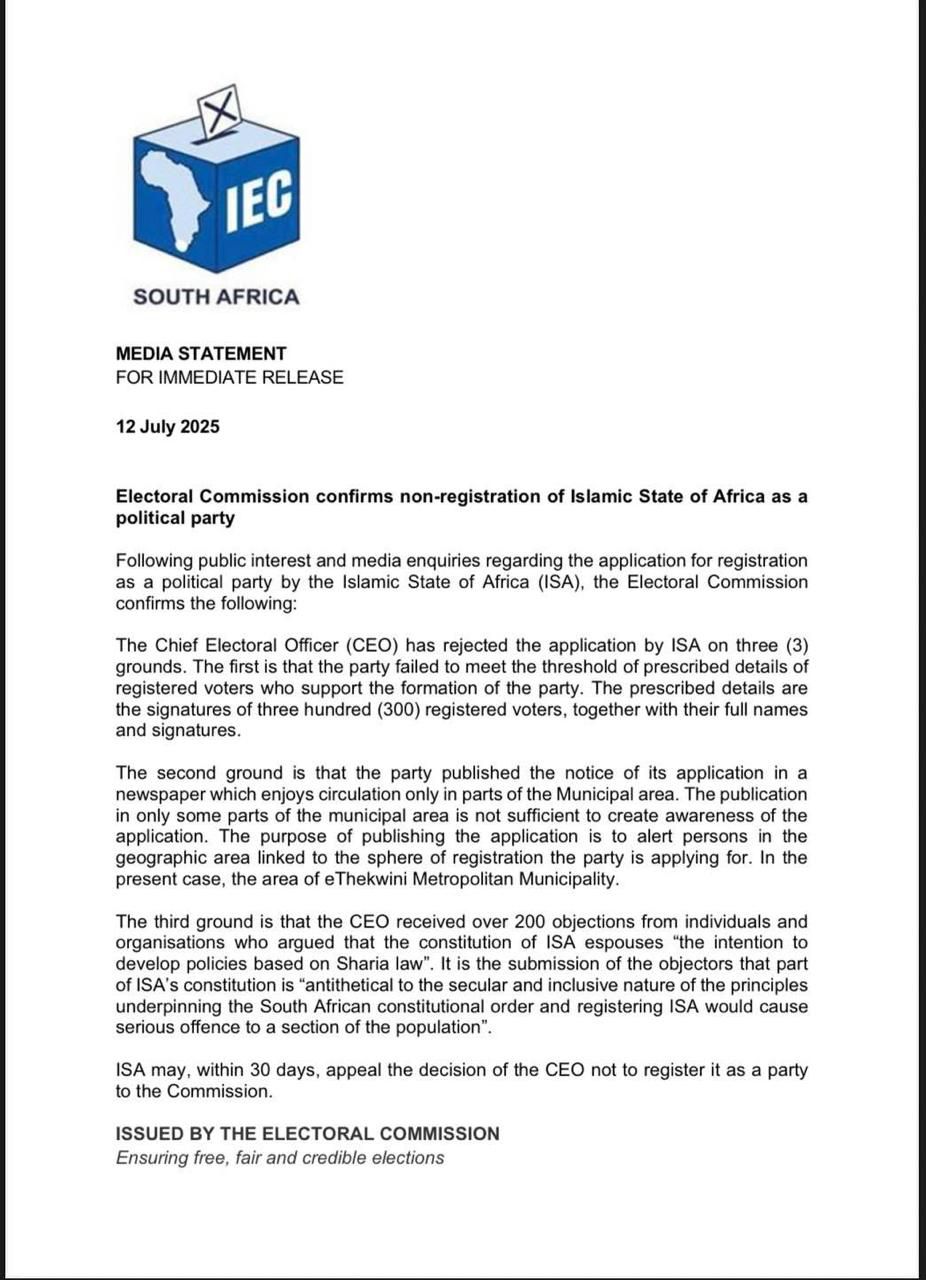Advert
Advert – scroll down
-
- Does the name “Islamic State of Africa” closely resemble known extremist and terrorist groups such as “Islamic State” (ISIS/ISIL)?
- Is this similarity likely to incite fear, confusion, and division among the public and could be perceived as glorifying or legitimizing such groups?
-
- Could the name and symbol may pose a threat to national security and social cohesion by invoking ideologies historically associated with violence, oppression, and terrorism?
- Is this inconsistent with the democratic values enshrined in the Constitution of South Africa?
Could the registration of a party bearing such a name be seen as promoting or inciting hatred, violence, or intimidation, which violates the principles of the Act?
Could the party’s symbol and messaging “Free all of Mankind”, in combination with its name, be interpreted as a radical or militant agenda, raising concerns about its intentions and public perception?
Public comments as delivered
 Loading...
Loading...
IEC statement on non-registration of ISA party

Original published notice

How to register a political party (IEC)
 Loading...
Loading...
Parties issued with de-registration notices in 2025
 Loading...
Loading...
Party registration regulations (gov gazette)
 Loading...
Loading...
In the News
-
- Daily Sun — IEC rejects Islamic State party!
- East Coast Radio — Controversial businessman fails to register ‘Islamic State of Africa’ party
- Central News — Durban Businessman to Appeal IEC Decision Rejecting Islamic State of Africa Party Registration
- Jacaranda FM — Islamic State of Africa founder to appeal IEC ruling
- Algoa FM — IEC rejects Islamic State of Africa’s (ISA) application to register as a political party
- The National Interest — South Africa Rejects ISIS-Linked Political Party
- News24 — IEC puts the brakes on new Sharia law party after 233 objections
- EWN — IEC rejects application by the Islamic State of Africa to register as a political party
- IEC — Electoral Commission confirms non-registration of Islamic State of Africa as a political party
- FDD — South Africa Rejects ISIS-Linked Political Party
- IOL – Durban businessman Farhad Hoomer launches political party advocating Sharia law
- News24 – From alleged terrorist to potential future president: Farhad Hoomer launches Sharia law party
- US Dept. of the Treasury – Treasury Designates Members of ISIS Cell in South Africa
- Daily Maverick – Farhad Hoomer and the broader picture of Islamic State-linked cases in South Africa
South Africa says NO to Islamic State political party’s Sharia ambitions
South Africa’s IEC Shuts Down Islamic State Political Party. South Africa’s Independent Electoral Commission (IEC) has officially shut down a political party allegedly linked to the Islamic State, citing national security concerns and violations of electoral regulations. The move highlights the country’s firm stance against extremism infiltrating its democratic institutions. As the region grapples with growing radical influences, the IEC’s action sends a strong message about the protection of constitutional order and the rejection of extremist ideologies in South Africa’s political landscape.
New Islamic State Political Party for KZN
Dr Levy Ndou weighs in on SA Politics: Registration of Islamic State of Africa party
Islamic State of Africa eyes 2026 LGE: Farhad Hoomer. A Durban businessman, previously accused of terror related activities, has now ventured into politics. Farhad Hoomer has lodged an application to register a political party, Islamic State of Africa, with its manifesto focusing on implementing Sharia Law. He said Sharia Law, a set of guiding principles for Muslims, is the only way to fix everything wrong in South Africa. Hoomer also said the party plans to contest the upcoming local government elections to create a footprint, with its ultimate goal being the national government.
Registration of Islamic State of Africa party. Leader of the Islamic State of Africa political party, Farhad Hoomer has asked South Africans to keep an open and unprejudiced mind with regards to his organisation. This, as he seeks to have it registered with the IEC to contest the 2026 municipal elections countrywide. Hoomer was at the centre of controversy in 2018 when he was charged with terrorism and accused of being the leader of a local ISIS cell, but the charges were later dropped. His political ambitions have been subjected to public scrutiny with questions being asked about whether the party should be allowed to stand in the polls.
STATEMENTS AND MEDIA RELEASES
Click on a logo to view.
Want to display your organisation’s statement? Click here.
